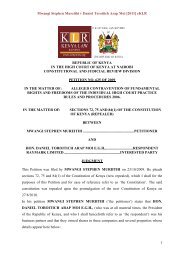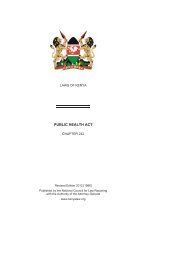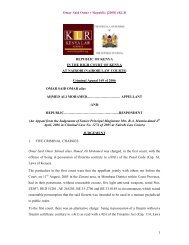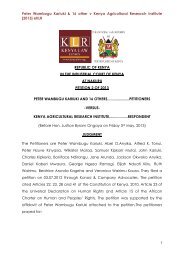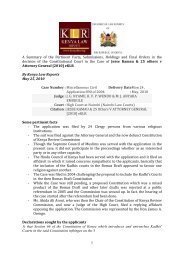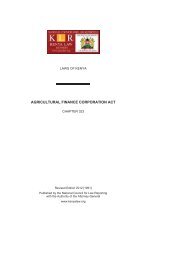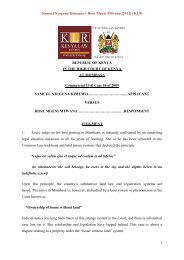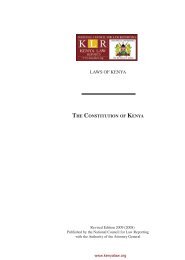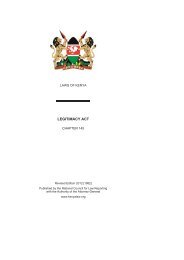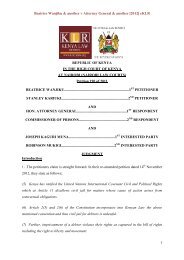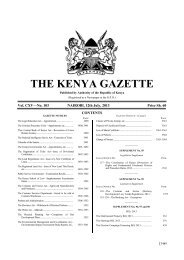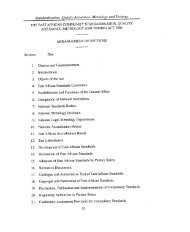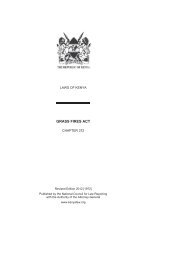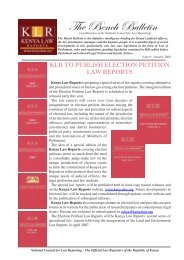Bench Bulletin - Issue 12 - Kenya Law Reports
Bench Bulletin - Issue 12 - Kenya Law Reports
Bench Bulletin - Issue 12 - Kenya Law Reports
Create successful ePaper yourself
Turn your PDF publications into a flip-book with our unique Google optimized e-Paper software.
KENYA LAW REPORTS<br />
BENCH BULLETIN<br />
FROM THE COURTS — COURT OF APPEAL<br />
3. Section 32 and 33 of the Succession Act must be read as being subject to the provisions of section 3 (2) of the<br />
Judicature Act, which provides that customary law will apply provided it is not repugnant to justice and morality, and<br />
is not inconsistent with any written law. The written law in this case was the Registered Land Act, which excludes<br />
customary claims over land registered under that Act.<br />
4. Parliament did not intend that customary law applies to agricultural land on intestacy, regardless of the result its<br />
application will give rise to. Therefore, although sections 32 and 33 of the Succession Act appear to mandate the courts<br />
to apply customary law or custom, in the distribution of a deceased’s agricultural land on intestacy, the application of<br />
such law is not absolute. It has to be subjected to strictures under section 3 (2) of the Judicature Act.<br />
5. A grant of letters of administration relates to the net estate of a deceased person. A share of property held in<br />
trust is not part of the deceased’s estate, but a charge over it and must be identified and excluded from distribution,<br />
to persons other than those beneficially entitled to it.<br />
6. The superior court erred in applying customary law without any proper basis, in absence of any Gazette notice to<br />
show the land fell in such an area in which customary law could be invoked.<br />
Appeal allowed, judgment of the superior court and any consequential orders set aside.<br />
Advocates:<br />
Mr. Kingori for the Appellants<br />
Mr. Kiminda for the Respondents<br />
Appellant’s Right to be Presented in the Court Within 14 Days of Arrest<br />
David Njuguna Wairimu v David Njuguna Wairimu<br />
Criminal Appeal no. 28 of 2009<br />
Court of Appeal at Kisumu<br />
S. E. Bosire, P. N. Waki & D. K. S. Aganyanya, JJ.A<br />
June 18, 2010<br />
Reported by Monica Achode<br />
Case History<br />
Appeal from a judgment of the High Court of <strong>Kenya</strong> at Kisii (Musinga & Karanja, JJ) dated 30th October, 2008 in H.C.<br />
Cr. A. No. 16 of 2006<br />
The Hon. Mr. Justice<br />
D. K. S. Aganyanya<br />
Constitutional <strong>Law</strong> – constitutional right – violation of appellant’s right to be presented to<br />
the court upon arrest within 14 days of such arrest – appellant having been brought to court<br />
after the prescribed period of 14 days – where the appellant had failed to raise that issue both<br />
at his trial and in his first appeal – language - failure to interpret the language of the court –<br />
appellant claiming that the court record was not clear whether proceedings were interpreted<br />
to the appellant – remedy for breach of constitutional rights – whether a doubt was created as<br />
to the appellant’s understanding of the proceedings – whether he was precluded from raising<br />
a constitutional issue at any other stage of the proceedings – Constitution section 72(3) and<br />
77(2)<br />
Charge – framing of a charge – duplicity in framing of charge – appellant claiming that the<br />
addition of the particulars relating to the wounding of the complainant in the robbery charge<br />
made it duplicitous – charge failing to include the words dangerous” and “offensive” to describe<br />
the weapons the robbers were armed with – effect of – whether the inclusion of one or more of<br />
the alternative modes of bringing a robbery charge made it duplicitous<br />
Criminal Practice and Procedure – appeal – second appeal – appeal against conviction and sentence for the offence of<br />
robbery with violence – grounds that the superior court failed to consider the defence – duty of the first appellate court –<br />
circumstances under which a superior court could rehash the conclusion of a lower court – whether this was objectionable<br />
– Penal Code section 296 (2) (Cap 63)<br />
The appellant brought the second and final appeal against a charge of robbery with violence contrary to section 296<br />
(2) of the Penal Code. Amongst the grounds adduced were that; the appellant’s Constitutional rights to be presented<br />
to the court upon arrest within 14 days of such arrest had been violated, that the language of the court had not been<br />
interpreted in a manner he could understand, that there had been a duplicity of charges and that the superior court<br />
had failed to consider all the evidence adduced against the appellant.<br />
<strong>Issue</strong> <strong>12</strong>: April-June 2010<br />
37



